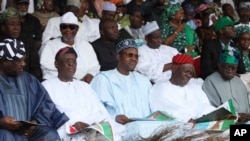ABUJA —
Since Nigeria's new mega-opposition party formed last year, it has been clear that they do not support the ruling People's Democratic Party.
The PDP has run Nigeria since the nation became a democracy in 1999 despite challenges from formidable opposition parties.
Last year, after years of trying and failing, the major opposition parties merged in the All Progressive Congress (APC) to contest the 2015 elections. Several of Nigeria's powerful state governors have defected to the new party.
At a conference in Abuja Thursday, APC leaders said fighting corruption is one of the new party's main priorities.
"Let there be no doubt in our minds at all about the link between corruption and lack of jobs in our country," said Babatunde Fashola who is the governor of Lagos state, Nigeria's financial capital.
"If we had a government that was serious about fighting corruption, there would be financial resources to create jobs," he added. " Instead of stopping this corruption, this government pardons those convicted of corruption and removes those who point it out."
The new party also says it will push for job creation, educational reform, religious freedom and unity among Nigeria's ethnic and religious groups.
Sixteen of Nigeria's 36 governors attended the rally, joined by other opposition leadership, including former military ruler and 2011 presidential candidate Muhammadu Buhari.
Analysts say the biggest challenge for the formerly competing parties will be to stand behind a single leader in the upcoming elections.
The candidate will likely face President Goodluck Jonathan, who has not made a formal announcement but is expected to run.
Buhari blames Nigeria's problems, like mass unemployment, widespread abject poverty, and an escalating insurgency in the north on the current government.
“We have tremendous human and material resources, but our lack of ability to put good leadership to manage these enormous resources, both human and material, has become our problem and the youth have become highly agitated," said Buhari.
Nearly 1,000 people were killed in post-election violence in 2011, and upcoming elections are expected to be the most hotly contested in Nigerian history.
The new opposition party has hopes to win the popular vote, and then pull off the first peaceful transition of power from one party to another in Nigeria's young democracy.
The PDP has run Nigeria since the nation became a democracy in 1999 despite challenges from formidable opposition parties.
Last year, after years of trying and failing, the major opposition parties merged in the All Progressive Congress (APC) to contest the 2015 elections. Several of Nigeria's powerful state governors have defected to the new party.
At a conference in Abuja Thursday, APC leaders said fighting corruption is one of the new party's main priorities.
"Let there be no doubt in our minds at all about the link between corruption and lack of jobs in our country," said Babatunde Fashola who is the governor of Lagos state, Nigeria's financial capital.
"If we had a government that was serious about fighting corruption, there would be financial resources to create jobs," he added. " Instead of stopping this corruption, this government pardons those convicted of corruption and removes those who point it out."
The new party also says it will push for job creation, educational reform, religious freedom and unity among Nigeria's ethnic and religious groups.
Sixteen of Nigeria's 36 governors attended the rally, joined by other opposition leadership, including former military ruler and 2011 presidential candidate Muhammadu Buhari.
Analysts say the biggest challenge for the formerly competing parties will be to stand behind a single leader in the upcoming elections.
The candidate will likely face President Goodluck Jonathan, who has not made a formal announcement but is expected to run.
Buhari blames Nigeria's problems, like mass unemployment, widespread abject poverty, and an escalating insurgency in the north on the current government.
“We have tremendous human and material resources, but our lack of ability to put good leadership to manage these enormous resources, both human and material, has become our problem and the youth have become highly agitated," said Buhari.
Nearly 1,000 people were killed in post-election violence in 2011, and upcoming elections are expected to be the most hotly contested in Nigerian history.
The new opposition party has hopes to win the popular vote, and then pull off the first peaceful transition of power from one party to another in Nigeria's young democracy.





